How Video Replay Might Have Changed World Cup History
- Get link
- X
- Other Apps
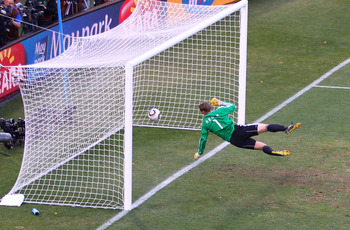
Following the game changing refereeing incidents in the World Cup’s second round, FIFA president Sepp Blatter has announced that the use of technology to help referees will be back on the agenda the next time all of soccer’s bigwigs meet for lunch.
I’m not sure why so many people seem to think this means change is on the way, when it is a rather obvious empty promise from an organization that had to say something in the wake of the weekend’s action.
Nevertheless, let’s run with the idea as we look back at the most famous refereeing errors in World Cup’s past to see how the course of soccer history might have been altered by video replays.
No. 5: Geoff Hurst’s Second Goal—England vs. West Germany (1966)
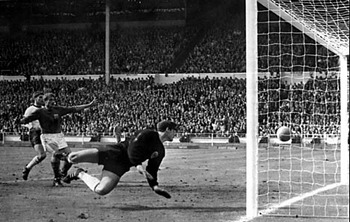
With the 1966 World Cup final between England and West Germany in extra—time following a 2—2 draw after 90 minutes, England striker Geoff Hurst crashed a shot off the underside of the crossbar.
The ball bounced on the line and a German defender kicked it clear.
However, the referee’s assistant Tofik Bakramov concluded it crossed the goal line.
A goal was awarded and England went on to win the game, 4-2 with Hurst completing the first ever World Cup final hat—trick.
The Alternative History:
Replays show the ball hadn’t fully crossed the line and no goal is awarded.
Germany breaks down the other end of the pitch to score and win the game 3—2.
Soccer doesn’t come home and the mood of national disappointment in England forces a dramatic rethink of the game.
The FA pumps money into developing young players and sends its coaches abroad to learn more about how the game is played elsewhere.
The 1970s see a young England team emerge, whose players display technical ability and tactical awareness that is new to the English game.
The team qualifies for 1974 and 1978 World Cups, before England finally lifts soccer’s biggest prize at the 1982 finals in Spain.
England continues to be one of the dominant forces in football, having added more World Cups to its name following triumphs in 1990 and 2006.
The holders are amongst the favorites to win the 2010 World Cup in South Africa.
Having easily won Group C and breezed past the last remaining African side Ghana in the second round, England is looking forward to a quarterfinal clash with Uruguay on Friday.
No. 4: The Assault on Patrick Battiston—West Germany vs. France (1982)
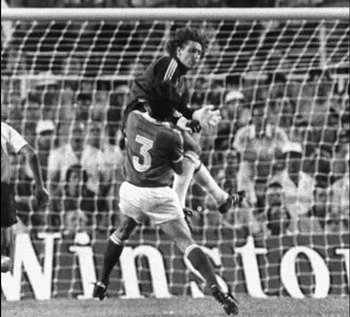
During a thrilling semifinal match between bitter rivals France and West Germany, with the scores level at 1—1, France’s Patrick Battiston was left unconscious on the pitch after a vicious challenge by West Germany goalkeeper Harald Schumacher.
The referee Charles Corver saw no foul and, with the ball having run out of play, awarded a goal—kick.
West Germany went on reach the World Cup final after beating France on penalties.
The Alternative History:
Corver watches the assault on video replay and shows Schumacher the red card.
Despite the loss of Battiston, France scores a winner against 10-man West Germany and goes on to beat Italy thereby winning the World Cup for the first time.
The talented French side wins the European Championships two years later and looks set to retain its world title at the 1986 World Cup.
France reaches the final against Argentina, having once more seen off West Germany in the semifinal.
However Les Bleus’ dreams are dashed by the South Americans whose captain Diego Maradona scores the winning goal with his hand.
The enraged French captain Michel Platini retires and maneuvers his way through soccer’s political circles and soon becomes head of Europe’s governing body UEFA.
He uses his position to introduce the use of video replays in World Cup soccer, a move that ensures the 1982 assault on Battiston is seen by the referee...
Wait a second! This alternative universe seems to have looped back on itself!
No. 3: The Hand of God—Argentina vs. England (1986)
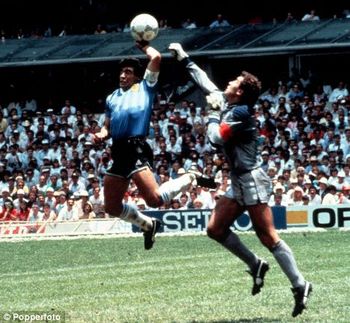
With the 1986 World Cup quarterfinal match against England delicately poised at 0—0, Argentina’s star player Diego Maradona punched the ball into the net.
Despite the protests of the England players the referee awarded the goal.
Maradona followed his illegal goal with one of the greatest goals of all—time to make it 2—0, before inspiring his team to win the World Cup.
The Alternative History:
Replays prove the English players were right to protest and the goal is disallowed.
A chastened Maradona doesn’t decide to take on the entire English defense single—handedly, and a dull game is decided in the final minutes when England striker Gary Lineker scores the winner.
England loses to Belgium in the semifinals, who is beaten by West Germany in a dull final.
The 1986 Mexico World Cup is remembered as one of the worst ever and soccer becomes dominated by inefficient, ugly teams.
A confident West Germany negates a talented Dutch team in the semifinal of Euro 1988 and goes on to win the tournament.
Meanwhile the life of a desperately disappointed Maradona spirals out of control as he binges on drugs and food.
Some things never change.
No. 2: Thierry Henry’s Handball—France vs. Ireland (2009)
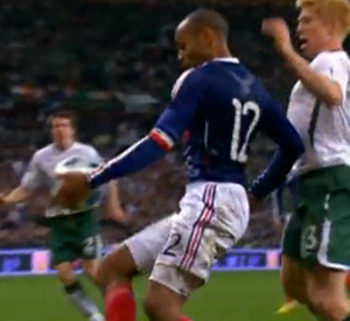
In the tense second leg of a play—off for the 2010 World Cup, Ireland had pulled back France’s 1—0 lead from the opening leg with a Robbie Keane goal.
The game went into extra—time and seemed to be heading for a decisive penalty shootout when Henry, twice, controlled a pass with his hands before crossing for William Gallas who scored the game winner.
The Irish players protested furiously but the referee allowed the goal to stand, ending Ireland's World Cup dreams.
France went on to disgrace itself in South Africa and was eliminated in the first round after finishing bottom of Group A.
The Alterative History:
Replays help the referee spot Henry’s infringement and Gallas’ goal is ruled out.
The game goes to a penalty shootout and feeling the pressure of a disgruntled Parisian crowd, Henry misses his spot—kick and Ireland qualifies for South Africa.
A favorable draw with seeded hosts South Africa helps the Boys in Green finish second in Group A and sets up a second round clash with Argentina.
After an early Carlos Tevez header is ruled out for offside, resolute Irish defending continues to frustrate Argentina’s stars and a counter—attack leads to a late winner for the underdogs.
The quarterfinal sees Ireland beat England’s conquerors Germany in a dramatic penalty shootout, and a place in the final is booked after Giovanni Trappatoni’s team outclasses Spain in the semifinal.
The World Cup final sees Brazil resort to negative tactics in a bid to stop Ireland’s fantasy football, but Kevin Kilbane scores the winner to bring the title home to Dublin.
No. 1: Frank Lampard’s Equalizer—England vs. Germany (2010)
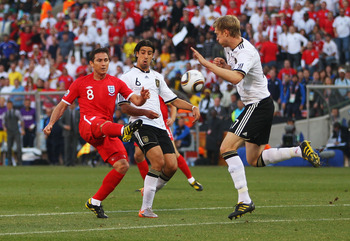
After Germany had raced to an early two goal lead in this second round match, England looked to have completed a dramatic comeback as halftime approached.
A Frank Lampard shot beat Germany goalkeeper Manuel Neuer and hit the crossbar before landing at least a foot over the line.
But neither the referee nor his assistant appeared to see that it had crossed the line and no goal was awarded.
Germany went on to win the game 4-1.
The Alternative History:
Replays prove that the ball had crossed the line.
A goal is awarded and the game reaches halftime with score at 2-2.
In the second half Germany continues to show the superiority displayed in the first half and runs out 4-2 winners.
England goes home without any excuses.
- Get link
- X
- Other Apps
Comments